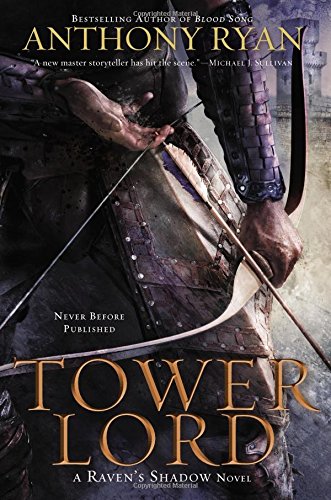Books have rhythm. Narratives have rhythm. When that rhythm is disrupted things fall apart very quickly. Tower Lord by Anthony has the rhythm of Kevin James in Hitch (2003). Which is weird, because Ryan’s debut novel, Blood Song, was like a breakdancer standing on his head with a beatbox accompaniment.
Blood Song, while a little clichéd, was digestible and addicting and incapable of being put down because the rhythm of it hooked the reader like an ear worm. Without that, Tower Lord falls apart, with a brutally benign first act and a dislocating sense of time and pace.
Ryan’s narrative resumes immediately after the conclusion of Blood Song. Vaelin returns to the Unified Realm determined to find his lost brother Frentis. Convinced Frentis is dead, the King has other ideas for Vaelin, and names him Tower Lord of the Northern Reaches, where conflict is never in short supply. But Frentis does live, and finds himself tied to a woman bent on destroying the Realm and everyone in it. While Vaelin yearns to find his brother, he is hunted too. Reva, daughter of the Trueblade whom Vaelin killed, seeks revenge for her father’s death and the sword he once carried to take up his mantle.
Like Blood Song, Tower Lord begins with Veniers, a historian of some repute. Now traveling as slave to the general of a massive host, Veniers records his owner’s victories as he tears across the Unified Realm. However, this time Veniers isn’t recording the novel as related to him, rather he’s recording a tiny slice of the larger narrative. Thus, these chapters aren’t a frame story as they were in Blood Song, merely another point of view that informs the rest of the book. They are, however, presented the same, using first person point of view and italicizing the entire chapter. Oddly, it seems Ryan tried to use the same frame story technique, while expanding his points of view, but the novel fails to connect the dots as a result of a jumbled ill-communicated timeline. Because the reader doesn’t know when things are happening, the interpretation is that they’re all happening simultaneously, an assumption that leads to no small amount of confusion.
The change in Verniers’ role is accompanied by new points of view that echo the style used by George R.R. Martin. Where Blood Song was told solely from Vaelin’s point of view, he is merely one of a cast in Tower Lord. New perspectives, including Reva and Frentis as mentioned above and Lyrna, a prominent character for the first novel, round out Ryan’s cast. Unfortunately, all they do over the first 300 pages is provide situations for the author to flesh out the world and introduce new storylines that are almost entirely unconnected from the previous novel. In other words, Ryan spends an inordinate amount of time talking about things the reader just does not care about, while glossing over the plot points highlighted in the first installment.
It’s not necessary that every book in a series echo the structure and style of the previous volumes. However, there is a consistency of voice and narrative that the reader expects. To accomplish wholesale change of that paradigm, to undermine expectations, an author must produce something so compelling that the change is sloughed off by the reader in favor of the thrilling ride. Something Ryan fails to do in spectacular fashion.
Blood Song worked because it presented questions in the first moments that demanded answers. Verniers on a ship with a dude everyone is scared of who has a story to tell. How did he get there? Who is he? What has he done to earn this fearsome reputation? The answering of those questions, told strictly from the perspective of Vaelin, revealing them in his own time, was a narrative style akin to catnip. Without these devices Ryan’s writing simply isn’t up to the task of carrying a traditional multi-point of view epic fantasy novel. Not to mention, there are simply too many names and places that Ryan presumes his reader can recall from the first novel without constant referencing. To say the least, he presumes too much.
Obviously, Anthony Ryan’s second novel is not a towering achievement. It is, truth be told, a rather large disappointment. Nevertheless the novel’s third act demonstrates the form that put Blood Song on the map, with strong set pieces that get the heart pumping. In the final tally these moments are far too few. Tower Lord is a novel synonymous with boredom, playing into all the stereotypes of epic fantasy. Thankfully, Blood Song stands perfectly fine on its own, and I have zero desire to read further.
Tower Lord is available now from Ace.
Justin Landon runs Staffer’s Book Review where his posts are less on-color. Find him on Twitter for meanderings on science fiction and fantasy, and to argue with him about whatever you just read.










